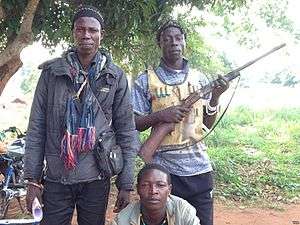Anti-balaka
| Antibalaka | |
|---|---|
|
Anti-Balaka militia in Gbaguili, a village located 340 km from Bangui | |
| Active | 2013–present |
| Leaders |
Levy Yakete (MRPRC) Patrice Edouard Ngaissona (CPLC branch)[1] Richard Bejouane Sebastien Wenezoui Joachim Kokate Aaron Levesque |
| Area of operations | Central African Republic |
| Opponents | Séléka |
| Battles and wars | Central African Republic Conflict |
The Anti-balaka are a militia and terrorist group fighting in the Central African Republic composed primarily of Christians. However, some Church leaders have contested the exclusively Christian character of such groups[2] and the Tony Blair Faith Foundation has also pointed out the presence of animists in Anti-balaka groups[3] as has journalist Andrew Katz.[4] They formed in the Central African Republic after the rise to power of Michel Djotodia in 2013.[5] There have been reports that some members of Anti-balaka groups have forcibly converted Muslims to Christianity.[6]
Terminology
Though "anti-balaka" is often translated as "antimachete", its origin is explained:
[It is] from the language of the young illiterates, who formed Seleka’s armed opposition, and who chased the Muslim ‘anti-balles à ti laka’ (anti ti laka bullets). The term ‘laka’ in the street language of the Central African Republic means an AK-47. The anti-balakas are therefore the bearers of grigris meant to stop Kalashnikov bullets.[7]
History
It is argued that village militias formed in the 1990s to protect from highwaymen was a precursor to the Antibalaka.[5] Unable to provide security throughout the remote areas of the country, President François Bozizé organized, to combat crime on the village level, self-protection groups in 2009 that took the name Antibalaka.[3]
In March 2013, President Bozizé (a Christian) was overthrown in the Central African Republic Civil War by a mostly-Muslim rebel coalition known as Séléka. The leader of the Séléka, Michel Djotodia, then became the first Muslim president of the country.[8] With the disbanding of the army by Djotodia, many army members joined the group, boosting their numbers and helping train them.[3]
Djotodia announced the dissolution of the Séléka in September 2013,[9] but most of the militias refused to disband.[10] The Séléka and the anti-balaka engaged in a cycle of increasing violence,[10][11] including reprisal attacks on individuals believed to be civilians by many.
As many Christians had more settled lifestyles and many Muslims were nomadic, claims to the land were yet another dimension of the tensions.[12] In November 2013, the UN warned the country was at risk of spiraling into genocide,[13] was "descending into complete chaos".[14] France described the country as "...on the verge of genocide".[15] On 2 December 2013, anti-balaka militiamen are suspected to have killed 12 people, including children, and wounded 30 others in an attack on the mostly-Muslim Fula in Boali, according to the government.[16] This was amidst the Central African Republic conflict under the Djotodia administration.
Early 2014 marked a turning point; hardened by war and massacres, the anti-balaka committed multiple atrocities,[4] including reported beheadings caught on tape.[17] In 2014, Amnesty International reported several massacres committed by anti-balaka against Muslim civilians, forcing thousands of Muslims to flee the country.[18][19]
See also
References
- ↑ "CAR Militia Leader Arrested in Congo Brazzaville". Voice of America. February 26, 2014. Retrieved 8 March 2014.
- ↑ "There are no Christian militias killing Muslims in the Central African Republic". Aid to the Church in Need. Retrieved 26 September 2016.
- 1 2 3 Emily Mellgard. "What is the Antibalaka?". tonyblairfaithfoundation. Retrieved 26 September 2016.
- 1 2 Andrew Katz (May 29, 2014). "‘A Question of Humanity’: Witness to the Turning Point In Central African Republic". Time.
- 1 2 C.Africa militia is an enemy of peace: French commander, apa.az, recovered 14 March 2014
- ↑ http://allafrica.com/stories/201507311230.html
- ↑ See: “La République centrafricaine: le naufrage d’un Etat, l’agonie d’une Nation», Didier Niewiadowski, Revue d’étude et de recherche sur le droit et l’administration dans les pays d’Afrique, May 2014, quoted in Blood Timber, How Europe Helped Fund War in the Central African Republic (Report), End Notes n. 21, p. 48
- ↑ "Religious tensions rise in C.Africa after coup". AFP. March 31, 2013. Retrieved December 4, 2013.
- ↑ "CAR’s Djotodia dissolves Seleka rebel group". AFP. 13 September 2013. Retrieved 5 December 2013.
- 1 2 "Unspeakable horrors in a country on the verge of genocide". AFP. 22 November 2013. Retrieved 5 December 2013.
- ↑ "CAR's death toll much higher than thought, says Amnesty". BBC News. 19 December 2013. Retrieved 19 December 2013.
- ↑ "'We Live and Die Here Like Animals'". Foreign Policy. 13 November 2013. Retrieved 25 November 2013.
- ↑ "UN warning over Central African Republic genocide risk". BBC News. 4 November 2013. Retrieved 4 December 2013.
- ↑ "BBC News - Central African Republic 'descending into chaos' - UN". BBC News. 26 November 2013. Retrieved 5 December 2013.
- ↑ "France says Central African Republic on verge of genocide". Reuters. 21 November 2013. Retrieved 4 December 2013.
- ↑ "Central African Republic militia 'killed' children". BBC News. 4 December 2013. Retrieved 5 December 2013.
- ↑ Prince, S. J. (20 December 2015). "WATCH: Christian Extremists Mass Behead Muslims in Africa".
- ↑ "Christian threats force Muslim convoy to turn back in CAR exodus". The Guardian. 14 February 2014. Retrieved 17 February 2014.
- ↑ "France and the Militarization of Central Africa: Thousands of Muslims Fleeing the Central African Republic". The Guardian. 14 February 2014. Retrieved 17 February 2014.
